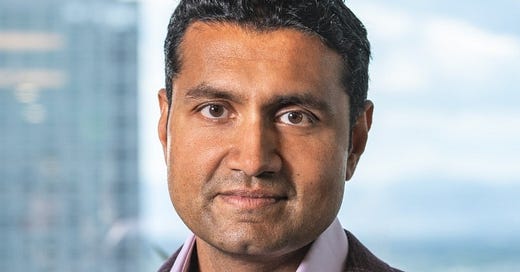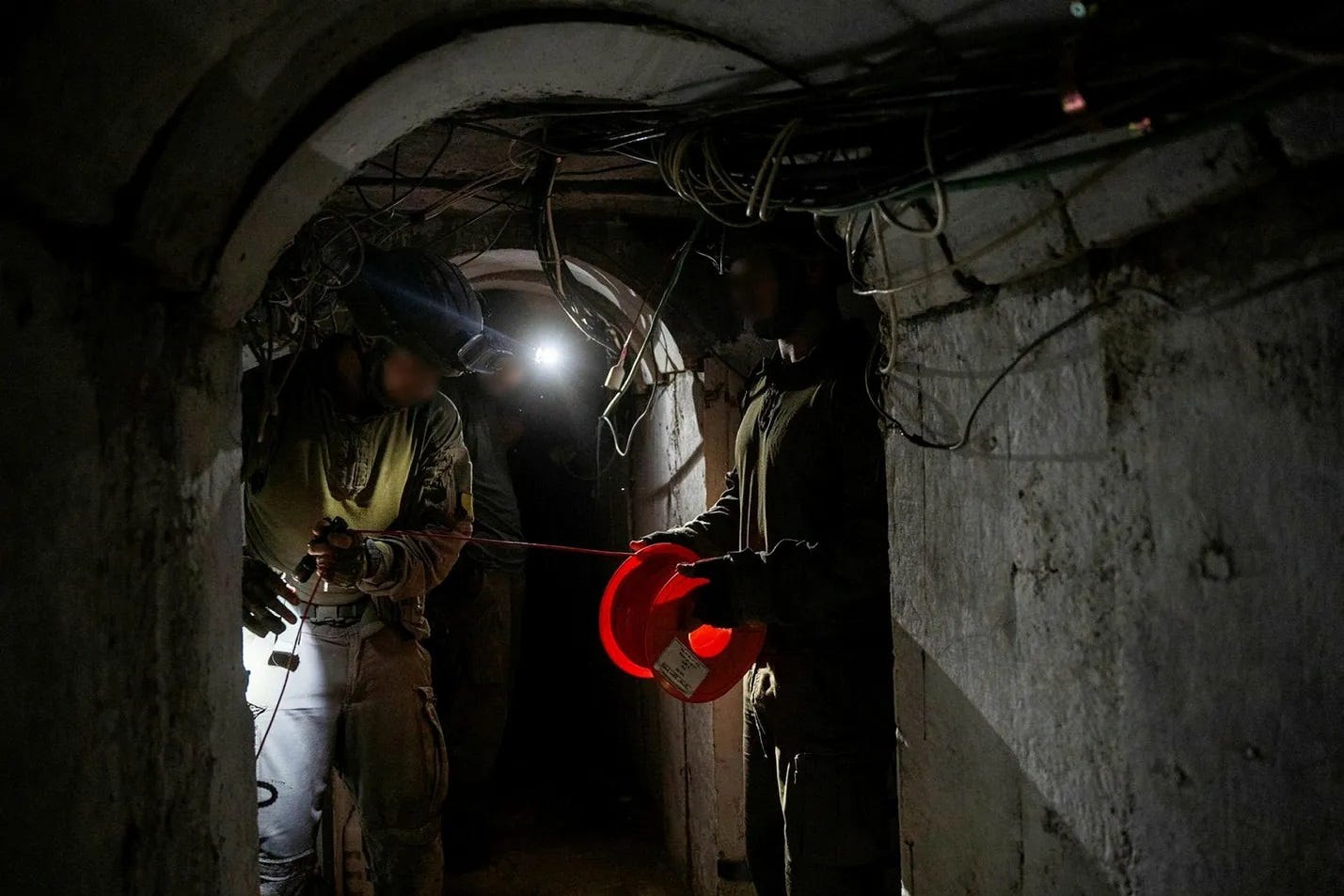Palantir's Identity Tied to Israel
Palantir's CTO Shyam Sankar delivers a stark diagnosis of Western military decline and finds inspiration in Israel's defense model
He came, he saw, he dropped a truth grenade. "The West has lost deterrence," Shyam Sankar, Palantir's Chief Technology Officer, told Israeli defense entrepreneurs this week. Over an hour-long Zoom webinar, Sankar listed the evidence: a pogrom in Israel, Russian aggression in Ukraine, Iranian provocations across the Middle East, Chinese militarization in the South China Sea. "We're in the 11th hour. And if we're going to deter World War Three, we have to get really serious about this."
Mr. Sankar, who joined Palantir as the 13th employee in 2006, dispensed with Silicon Valley's typical techno-optimism. Instead, he offered a surgical dissection of bureaucratic and cultural failings that have calcified Western defense capabilities precisely when agility matters most. His assessment carries weight. Palantir, America's most unashamedly controversial and dynamic defense software firm, became the first new defense company added to the S&P 500 in 46 years—"a statistic that looks much more like European capital markets than the otherwise highly dynamic American ones," he noted. The company now has a $200B market cap.
Sankar’s connection to Israel runs deep, introducing himself as "the biggest Zionist at Palantir, including him [Alex Karp]," referring to the company's CEO, who himself is as staunch of a supporter of Israel as you can get. He then put on a yarmulke —he calls it his Shyarmulke—showing it off to the over 400 attendants who logged on to hear him speak. Sankar led Palantir’s work in Israel right from the start of its activities here in 2013 and has been closely involved ever since. “Some of the work I’m proudest of ever having done is in Israel. I kind of joke I'm not a Hindu, I'm a Hinjew.”
Palantir’s bond with Israel extends to the company's identity; he revealed that Palantir's "Defense Reformation" document, with its 18 theses, contained a "little wink to the chosen people"—the number 18 carrying symbolic significance in Jewish tradition.
He pointed to Israel's post-October 7th mobilization as offering a brutal case study in defense innovation. The 360,000 activated reservists "got more done in the four months after October 7 than in the 10 years beforehand," he asserted. This success stemmed not from some innate Israeli quality but from structural advantage: seasoned practitioners returning from industry. "They now have 20 years of experience in industry building internet-scale technologies, having made a shit ton of mistakes that allows them to move faster."
America, by contrast, has systematically severed this knowledge flow. "We make voluntary civil-military fusion very, very difficult," Sankar observed. "It's kind of a one-way trajectory. You start in the military, and then you leave to industry. There's not a lot of miscegenation."
While Sankar is ‘mostly’ right about Israel’s more fluid military-civilian structure, the picture isn’t as clear-cut as he made it out to be. As I’ve noted previously, Israeli warfighters found it almost impossible in many cases to bring solutions from their civilian techie lives into the military, with disastrous results. Case in point: Enemy drones covered Israeli airspace for much of the war with seeming impunity. Gaza’s extensive tunnels make the hardcore of Hamas’ military almost invulnerable. Solutions to these problems exist in the civilian tech industry. Getting them implemented in the army isn’t so easy.
Where are Israel's Defense Tech Startups?
Still, Sankar’s assessment of the US defense situation is stark. The structural disconnect between defense and civilian tech is worsened by America's personnel policies. "We have a law that forces our military officers to move every two to three years to different positions," he explained. The consequences are devastating: "You can't build the nuclear Navy that way. You can't build a ballistic missile that way. You're not even in the job long enough to have made mistakes to learn from."
The critique extends to procurement. America has "a five-year central plan for defense acquisition...called the Future Years Defense Program (FYDP). They changed it to future development just so it didn't sound too Soviet, but we have it." Central planning, Sankar argues, has infected the very system designed to defeat it.
Israeli organizational culture offers another advantage. Where Western institutions privilege consensus, Israeli teams embrace productive conflict: "Lots of smart people who are highly opinionated, who are not scared of arguing with each other... that's a precondition to winning." This mirrors Palantir's own ethos of challenging orthodoxy.
Iron Dome architect Danny Gold's experience proves instructive. Gold faced stubborn bureaucratic resistance—"it was deemed an illegal acquisition" because "some technical rule here or there wasn't followed." Mr. Sankar's verdict was unequivocal: "That's kind of bullshit. If you follow the rules, it's a way of running your country into the ground."
The Silicon Valley executive displayed unusual candor when discussing October 7th and its aftermath. While the attack was horrific, "October 8 was the worst day of my adult life," he stated, contrasting Hamas's assault with al-Qaeda's. "September 11 really failed in the sense that it unified the West, and October 8 revealed a huge amount of rot and disease that has taken over the West."
For Western defense establishments, the diagnosis is damning: bureaucratic caution and rigid procedures have frozen innovation when technological agility matters most. "Your organization becomes 100x more productive, not 100% more productive," he noted when discussing enterprise autonomy. "With things like defense, it's kind of a winner-take-all scenario. Incremental decision advantage translates into a determinative outcome."
I had to de-jargonize that to understand what Sankar meant. Basically, autonomous technology —like robots, drones, guided missiles, etc— can transform military organizations by creating exponential rather than linear improvements, and in competitive fields like defense, even a small edge in decision-making speed or quality can be the difference between success and failure—making these technological advances strategically crucial.
But these effects raise fundamental questions about Western military preparedness, not just tactical advantages. "Anyone who's built anything knows you figure out a bunch of this stuff as you go through it," he said, critiquing US military requirements documents hundreds of pages long.
Sankar's critique suggests Western nations have not merely failed to advance but actively dismantled institutional structures that once delivered technological superiority. Where America once seamlessly integrated civilian and military expertise—"Chrysler used to build cars and missiles, General Mills, the cereal company used to build torpedoes"—today's defense industrial base has become isolated, specialized and risk-averse.
The financial structure of defense must also change. "Cost-plus is communist," Mr. Sankar declared, referring to contract models that reimburse expenses plus a fixed profit. "It basically values the inputs you're putting in, not the outputs." Space launch offers a compelling example: "It used to cost $50,000 a kilogram to get to orbit on the shuttle. With Starship heavy reuse, Elon [Musk] has gotten that down to 10 to 20 bucks a kilogram."
This dramatic price plunge wasn't achieved through government micromanagement. "NASA's own cost estimates to build the Falcon Nine were $4 billion. Elon did it for 400 million," he noted. "Should you make less money because you're on cost-plus and you did it 10 times cheaper? That doesn't make any sense."
The founders that once drove America's military-industrial complex have disappeared. "Once upon a time, Northrop Grumman was actually Jack Northrop and Leroy Grumman. They were two separate companies with strong, hard-headed founders," he explained. "Glenn Martin, not Lockheed Martin... the Lockheed brothers. For all these companies we look at today, there were real founders who cared more than about what's going to happen this quarter."
The good news? "The founders are back," Sankar declared. "More than $100 billion capital has been deployed in Western national interests." Finding these entrepreneurs is critical—but so is funding them properly. "The defense buyer has a huge receptivity," Sankar acknowledged, but warned against "innovation theater" that spreads funding too thinly. "There's a natural desire in government to peanut-butter spread the money around... That is a way to guarantee failure for all."
Sankar’s key message is crystal clear: when technological advantage determines survival, bureaucratic constraints become existential threats. Palantir, which sued the US government to break procurement barriers, sees in Israel a kindred spirit—a nation that embraces the "founder personalities" and "interpersonal friction" that Sankar considers prerequisites for defense innovation.
"Finding believers is a precondition to winning," Mr. Sankar advised emerging Israeli defense entrepreneurs. "There are still people that will fight and do everything to protect Israel and protect the Jews," he assured his Israeli audience, "and please know I'm first among them."
“You are not alone.”







